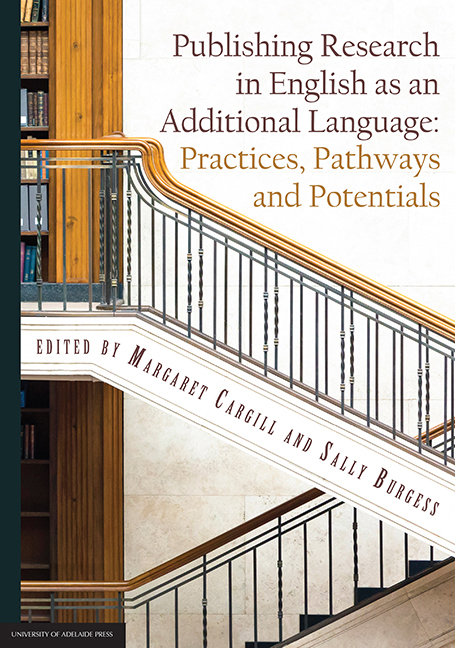Book contents
- Frontmatter
- Contents
- List of contributors
- Acknowledgements
- Foreword
- Introduction: Unpacking English for Research Publication Purposes [ERPP] and the intersecting roles of those who research, teach and edit it
- 1 Accept or contest: A life-history study of humanities scholars’ responses to research publication policies in Spain
- 2 Introducing research rigour in the social sciences: Transcultural strategies for teaching ERPP writing, research design, and resistance to epistemic erasure
- 3 Blurring the boundaries: Academic advising, authors’ editing and translation in a graduate degree program
- 4 The delicate art of commenting: Exploring different approaches to editing and their implications for the author-editor relationship
- 5 The CCC Model (Correspondence, Consistency, Correctness): How effective is it in enabling and assessing change in text-editing knowledge and skills in a blended-learning postgraduate course?
- 6 How credible are open access emerging journals? A situational analysis in the humanities
- 7 Disseminating research internationally: Intra-subdisciplinary rhetorical structure variation in immunity and allergy research articles
- 8 Scientists publishing research in English from Indonesia: Analysing outcomes of a training intervention to inform institutional action
- 9 ‘The one who is out of the ordinary shall win’: Research supervision towards publication in a Chinese hospital
- 10 The geopolitics of academic plagiarism
- 11 Training ‘clerks of the [global] empire’ for 21st-century Asia? English for Research Purposes (ERP) in Vietnam
- 12 Standardisation and its discontents
- Reflections and future directions in publishing research in English as an Additional Language: An afterword
6 - How credible are open access emerging journals? A situational analysis in the humanities
Published online by Cambridge University Press: 16 March 2018
- Frontmatter
- Contents
- List of contributors
- Acknowledgements
- Foreword
- Introduction: Unpacking English for Research Publication Purposes [ERPP] and the intersecting roles of those who research, teach and edit it
- 1 Accept or contest: A life-history study of humanities scholars’ responses to research publication policies in Spain
- 2 Introducing research rigour in the social sciences: Transcultural strategies for teaching ERPP writing, research design, and resistance to epistemic erasure
- 3 Blurring the boundaries: Academic advising, authors’ editing and translation in a graduate degree program
- 4 The delicate art of commenting: Exploring different approaches to editing and their implications for the author-editor relationship
- 5 The CCC Model (Correspondence, Consistency, Correctness): How effective is it in enabling and assessing change in text-editing knowledge and skills in a blended-learning postgraduate course?
- 6 How credible are open access emerging journals? A situational analysis in the humanities
- 7 Disseminating research internationally: Intra-subdisciplinary rhetorical structure variation in immunity and allergy research articles
- 8 Scientists publishing research in English from Indonesia: Analysing outcomes of a training intervention to inform institutional action
- 9 ‘The one who is out of the ordinary shall win’: Research supervision towards publication in a Chinese hospital
- 10 The geopolitics of academic plagiarism
- 11 Training ‘clerks of the [global] empire’ for 21st-century Asia? English for Research Purposes (ERP) in Vietnam
- 12 Standardisation and its discontents
- Reflections and future directions in publishing research in English as an Additional Language: An afterword
Summary
Introduction
Open access [OA] scholarly publishing has grown rapidly over the last decade and has succeeded in consolidating its position as a valid vehicle for the publication of journal articles and the dissemination of research findings (Laakso et al., 2011; Salager-Meyer, 2012). At its most basic, OA journal publishing refers to the free and unrestricted online access to full-text articles published in academic journals. Unfortunately, alongside the increase in numbers of OA journals, academic publishing has also seen the emergence of predatory publishers — that is, those ‘which publish counterfeit journals to exploit the open-access model in which the author pays’ (Beall, 2012, p. 179). These journals not only impact the OA movement and confidence in peer-reviewing (Beall, 2012; Bohannon, 2013; Bartholomew, 2014), but also put the credibility of rigorous research at risk, while fomenting confusion among unsuspecting novices seeking a target journal for their work. OA can claim to offer authors and their research ‘vast and measurable new visibility, readership, and impact’ (Budapest Open Access Initiative, 2002, n.p.). Clearly, free unlimited access to journals enhances the visibility of an article — thus, raising its impact and increasing citation counts (in some cases by as much as 250%, according to Harnad, 2008). The deleterious influence of predatory practices casts a shadow of doubt over the OA model and impinges on the reputation of certain journals, particularly those accessed or published exclusively online; young, small or peripheral journals (that is, published by developing or peripheral countries and outside the scope of mainstream publishing houses, as defined by Salager-Meyer, 2015); or those that are not (or not yet) abstracted or indexed in reputable databases and lists. Fear of plagiarism, concerns pertaining to copyright and digital archiving, scepticism about the maintenance of research quality and integrity, fear of the absence of the controls resulting from peer review (hence, poor quality control), or the claim that the very existence of scholarly journals is threatened — these are all reasons that work against the OA model (Salager-Meyer, 2012).
- Type
- Chapter
- Information
- Publishing Research in English as an Additional LanguagePractices, Pathways and Potentials, pp. 121 - 150Publisher: The University of Adelaide PressPrint publication year: 2017



